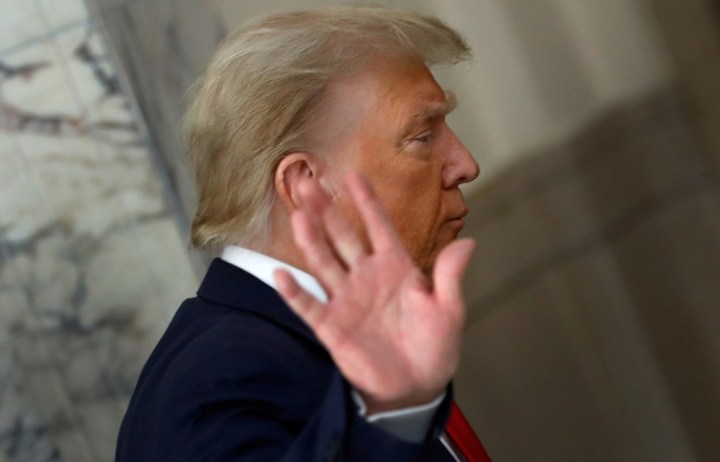BUSINESS REFLECTION
After The Bell: The strange meaning of Trump’s new billions

The former US president may be caught in an odd loop structure: so long as he doesn’t try to get his hands on the cash, his notional wealth remains enormous. As soon as he does, it disappears. Sad!
I find the listing of former US president Donald Trump’s media company fascinating, for all kinds of reasons, some of which are not pleasant.
First, there is just the pure, hectic irony of it all. There Trump was, struggling to pay a $460-million bond in his civil fraud case, which, by the way, demonstrated unequivocally that he is not as rich as he has always claimed. Trump’s political opponents were presumably rubbing their hands in glee because the money he was collecting to fund his presidential campaign might end up on ice, making his re-election less certain.
But then, in a twist reminiscent of the turbulent storyline of Game of Thrones, his media company, the Trump Media & Technology Group, became a public company late last month and all of a sudden, Trump was technically about $3-billion richer. Boom. You just can’t keep up with this stuff. Or make it up.
Technically, Trump, who owns 57.6% of the company, can’t sell his shares for six months. But with that wealth on the books and the fact that his bond was reduced to $175-million, he was able to borrow enough to cover the bond. How does he manage to keep weaselling out of these problems? It’s mind-boggling. Of course, this is not the end of his problems; he is still facing three criminal trials and a total of 91 charges. And then there is a whole bunch of civil cases.
But let’s leave aside the political issues and focus for a moment on the listing of the media company, because this bears some scrutiny — not just of the listing itself, but also of what it means for investing around the world.
The question is: How can a company with a revenue of $4-million and one asset, the social network Truth Social, be worth $6-billion? The social network has about 600,000 active monthly users (compared to 368 million on X) and has publicly said it has secured zero advertising revenue and “expects to incur significant losses into the foreseeable future”.
You may be forgiven for asking whether stock markets have gone completely mad (not an infrequently asked question!) The answer is both yes and no. But something has definitely changed. The person who really untangles this fabulously is Bloomberg columnist Matt Levine in his column, Money Stuff.
A gambling game
Please forgive the extended quotes, but it is too interesting to paraphrase. Levine says that for hundreds of years, stock market speculation was essentially a psychological gambling game. There was only limited access to high-quality public financial information and there was no access to the most important tool in the history of stock analysis. Excel. (Joke.)
Stage Two kicked off in the late 1930s when public companies were required to publish audited financial statements, making it possible to analyse their cash flows. Professional investors emerged who did this analysis, eventually using computers (and Excel, not joking) and there was a relationship between fundamental value and the price of the stock. This was underpinned by fairly stable industrial companies, so it was more or less possible to predict their cash flows.
Stage Three happened, says Levine, perhaps three years ago with the sudden rise in GameStop’s share price. The rise ushered in the era of meme stocks, stocks that trade purely on sentiment and attention rather than anyone’s views about fundamental value. This is the crucial insight: the value of the company’s cash flows probably does set a real floor under a stock price, because if the stock is worth less than its cash flows, someone can buy the company and take the cash flows for themselves. But it doesn’t put a ceiling on the price.
“There is no law of nature requiring that a stock’s price has to equal the present value of its future cash flows, or even that it has to equal the market’s collective estimate of its future cash flows. That’s just a matter of tradition, and the tradition is only like 80 years old. But the tradition could always change. Now maybe stocks will trade based on … I don’t know, something else, collective attention, online sentiment, the desire to ‘outwit the crowd’,” Levine writes.
The ultimate meme stock
And so we are just about back to the original characterisation of investment where investing in stocks can once again be “pure tokens in a psychological gambling game”. And really, there is no better example of this at the moment than the Trump Media & Technology Group; it’s the ultimate meme stock because investors are essentially buying the stock for identity reasons that have absolutely nothing to do with the business itself. The support of the Maga crowd provides the same kind of crazy investment phenomenon as the WallStreetBets Reddit did for GameStop.
What are the laws of meme stock investment? Here is the problem: nobody knows. There may be none, but if there were, may I suggest a few. First, if meme stocks are a form of self-expression, then so much depends on the prospects of the meme. The second law of meme stocks is that they are very vulnerable to a sudden outburst of common sense.
In some ways, the history of GameStop tells us all we need to know. GameStop was a popular retailer of computer games, so its clientele was typically young men who loved the undeniable thrill of blasting at imaginary opponents on their screens. They coalesced to support their favourite retailer and spread the word on the internet. In the context of a stock which has a very small turnover, the price started spinning, drawing more people into the fray.
In no time at all, there was a 1,500% increase in GameStop’s share price over two weeks, reaching an all-time intraday high of above $500. The increase was partly due to a short squeeze. This is where many investors have “shorted” the stock, betting that the share price will decline. But instead, for some reason, it rises. The result is that the shorts get “squeezed” and they desperately bail out of their positions to avoid even higher losses. That tends to push the price up further, increasing the intensity of the squeeze.
These events are typically temporary. All this happened in early 2021, but the share price of GameStop has gradually declined since then and now it’s back to $12. As the decline accelerated, the vocal demands of the gamers on Reddit that nobody should sell, gradually shrank as well. Without this vocal support and without a reason to identify with the stock, it reverted to being the rather dull retail stock it is today. It’s worth noting, however, that the share price is still way above the level at which it was trading — less than a dollar — before the craziness began. As they say, there is no such thing as bad publicity.
What does this mean for Donald Trump Media? My guess is that everything depends on the chances that Trump will get elected. The people who want to identify with him will support the stock until his influence fades and I’m very much afraid that is not going to happen any time soon. But it might well tank if he loses the election and, conversely, it will surge if he is elected president.
And that means one other thing: it’s very difficult and very expensive at the moment to short the stock. The market knows that Trump not only has supporters, he has devotees, which means that enthusiastic buyers will always be out there. Again, it’s all very psychological. Another interesting thing to watch is what is happening on the prediction market platforms. On Manifold, for example, 71% of punters think Truth Social’s shares will crash by the end of 2024.
One reason for this is that if Trump does sell some of his stock after his share lock-up ends in September, then that could change the psychology: who would want to identify with a person by investing in his company when that person himself is no longer investing in the company? It’s possible that Trump is caught in an odd loop structure: so long as he doesn’t try to get his hands on the cash, his notional wealth remains enormous. As soon as he does, it disappears. Sad!
But, on the other hand, this is Trump we are talking about so don’t be surprised if he finds a way to weasel out of the tight corner once again. DM



















Forbes has just included Trump in its 500 richest people in the world with an estimated $6 billion. Substracting the $3b he gained with the recent share listing his prior worth was approx $3b. This gives Trump the right to claim to be rich. The author should stop misleading the Daily Maverick readers or provide evidence on his claims.
And perhaps you could explain to us the methodology Forbes uses if you trust them that much. I don’t doubt Trump is rich, even $100 mil would surely qualify. BUT if his wealth is in overstated property values (see New York criminal conviction) and opaque, amorphous “brand value”, then he might have a problem.
The question is less whether Trump is rich than whether he is a complete charlatan extraordinarily good at misleading and misdirecting an increasingly gullible and media blinkered voter base. We have likewise entered “phase 3” of voting. Maybe Trump should rebrand as “TrumpStop” ?
And with lightning speed the first Trump supporter appears to come up for his idol.
Thanks
“New Billions” se voet.
The numbers are the only thing that matter. Consider
# On 26 March the all time high was $79.38. Implied Market Cap $10.8 billion. Misleading much
# The price has dropped every day since 26 March until closing on Friday 5 April
# On Friday 5 April the closing price was $40.59. Market Cap $5.5 billion
#A decline in price and Market Cap of 49% in 11 days
# If this trend continues then trumps 57.6% is absolutely valueless
# Could not happen to a finer guy
# Brace yorselves for MAGA inspired conspiracy theories
# Pity about the base